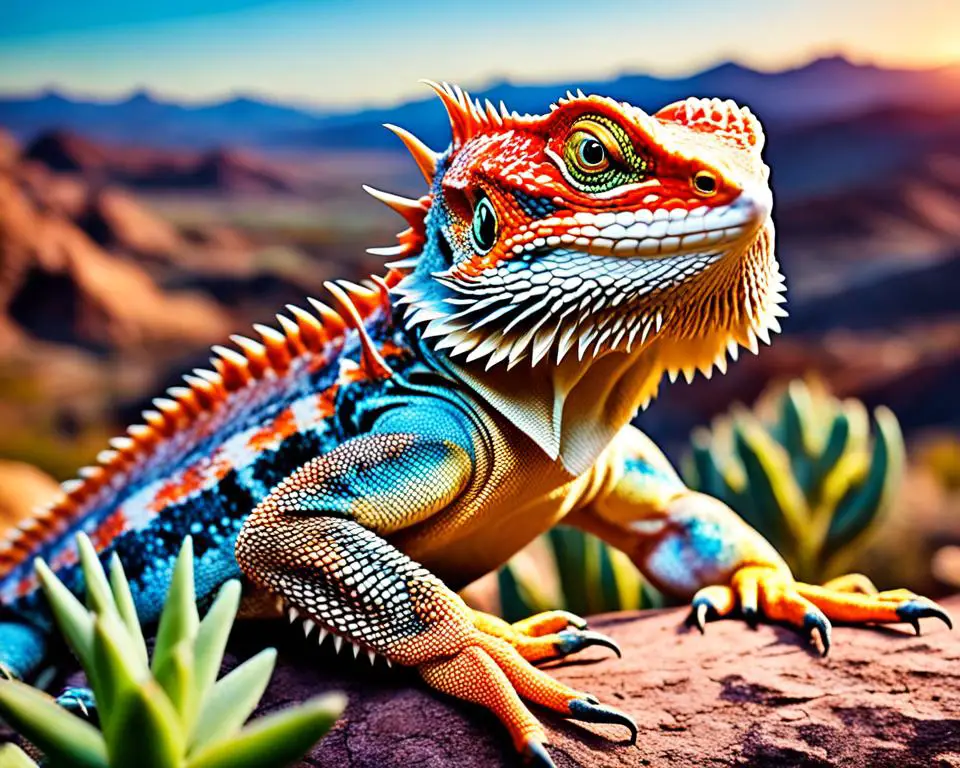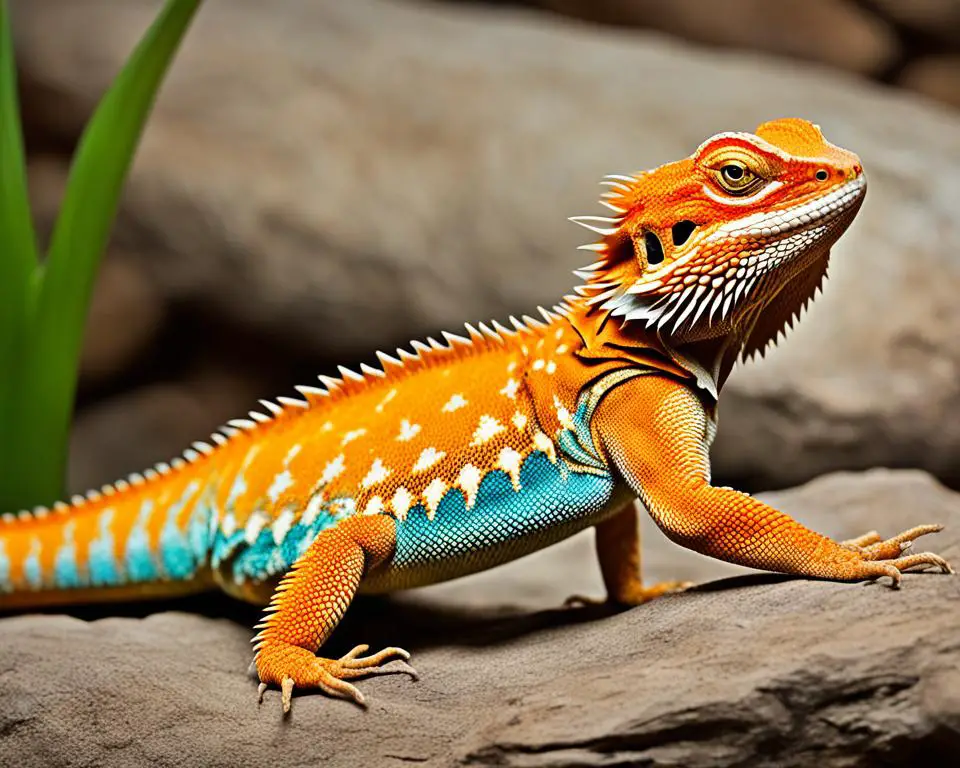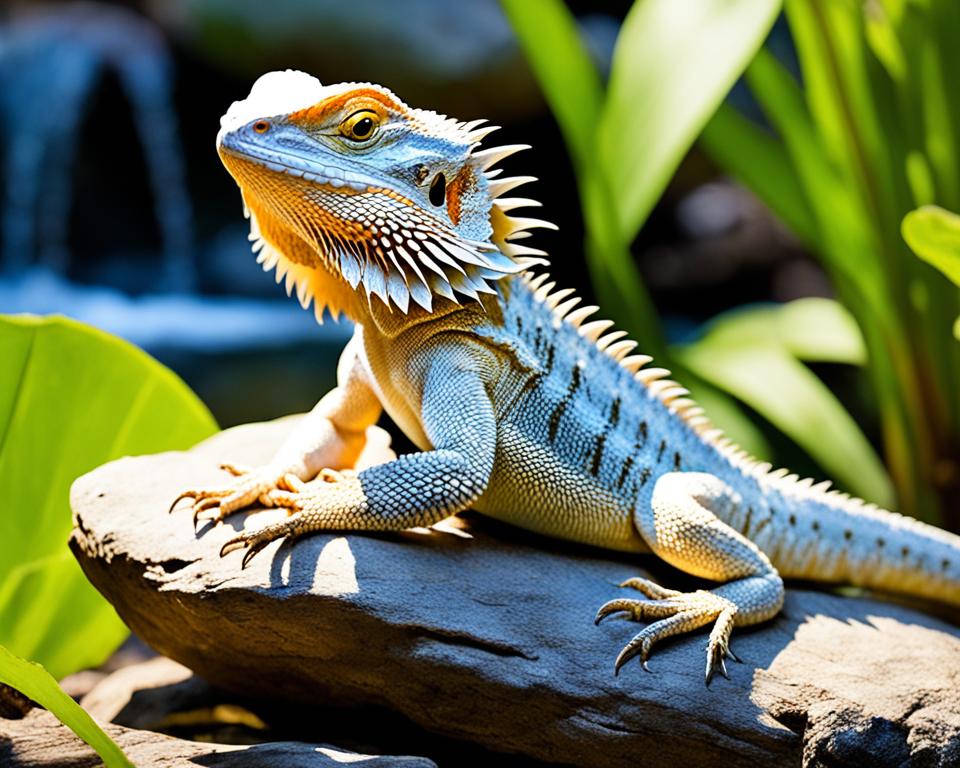Bearded dragons are commonly kept as pets due to their easy-going nature and adorable appearance. However, many people who keep bearded dragons as pets may notice that their lizards often seem to run away when approached or disturbed.
So, why is your bearded dragon scared?
In most cases, this behavior is primarily an instinctual response. In the wild, beardie dragons are prey animals, and they need to escape from potential predators, such as hawks, in order to stay safe.
The first year’s bearded dragons tend to be more fearful than adults. This is because they have not yet learned what it means to be safe and comfortable around humans.
They become less afraid as they age, but some things can still scare them.
It’s important to understand how to tell if a bearded dragon is scared because you never know when he might bite you.
That’s why we’ve compiled a list of signs to help you determine if and when your bearded dragon may get scared and how to help him feel more comfortable.
Read? Let’s get started!
Are bearded dragons scared of fireworks?
Bearded dragons may become scared of fireworks due to their sensitivity to loud noises and bright lights. Signs that a bearded dragon is scared of fireworks include hiding, glass surfing, puffing up their beard, and being more lethargic than usual. Providing a quiet and safe environment during firework displays can help alleviate their stress.
Why is your bearded dragon scared of you?
Bearded dragons may be scared of their owners due to various reasons, such as sudden movements, loud noises, or unfamiliar scents.
They might also feel threatened if they’re handled in a way that makes them uncomfortable. To build trust with your pet, approach slowly, use gentle motions, and create a calm environment.
Why do bearded dragons run away when you try to pick them up?
Bearded dragons are naturally timid creatures and can be easily scared when approached by humans. When these animals feel threatened, their instinct is to run away. This is true even when you simply try to pick them up.
The main reason why bearded dragons run away when you try to pick them up is that they don’t recognize human behavior as reassuring.
That said, as a new bearded dragon owner, it is important to understand that there may be more to this behavior than just instinctual fear.
Let’s dive more into the reasons behind these behaviors.
What are bearded dragons scared of?
Bearded dragons can become scared for a variety of reasons. Most often, their fear is caused by the presence of an unknown object or situation, like a new human in their presence, loud noises, or a sudden change in lighting.
In the wild and captivity, there are things that may scare your bearded dragons. These include:
- Predators. Snakes, lizards, cats, dogs, and big birds, are all potential predators capable of scaring bearded dragons into hiding.
- Sudden movement. Bearded dragons can become frightened if something unexpected happens in their surroundings. This can be anything from quick movements to loud noises to an unfamiliar scent entering the room they’re occupying.
- Isolation. It’s not natural for bearded dragons to be forced into solitude, and being alone for long periods of time will lead to stress and fear in these creatures.
- Loud noises. Bearded dragons have excellent hearing and can be scared by loud noises such as television, fireworks, and vacuum.
All these situations have the potential to scare a bearded dragon. As such, it’s important to ensure you create an environment that minimizes discomfort or anxiety for your pet.
Are bearded dragons scared of everything?
Bearded dragons are not scared of everything. While they may be more easily startled than other animals, they can usually adapt and become somewhat accustomed to their environment.
That said, when properly introduced and socialized, bearded dragons tend to become comfortable interacting with other pets in the household over time.
What are the signs of a scared bearded dragon?
Signs of a stressed or scared bearded dragon may include:
- Hiding in their enclosure or behind rocks, furniture, or other objects.
- Refusing to feed due to stress-induced inactivity.
- Becoming more aggressive when handled and showing aggression towards other species.
- Fleeing from any new object that enters the enclosure.
- Hissing and puffing up is a signs of aggression.
- Digging feverishly at the bottom of their enclosure and pacing around it in a circle as if they can’t find a way out.
- Excessive scratching and biting, most likely due to them feeling insecure in their environment.
Also, watch for signs that your bearded dragon is trying to avoid something, such as turning away from certain objects or entering certain areas of their cage less often than usual.
How do you tame a scared bearded dragon?
Taming a scared bearded dragon requires patience and gentle handling. It is crucial to remember that these lizards may be naturally timid or scared, so it is important to build trust between you and the dragon.
That said, let’s explore some steps you can take to help your frightened bearded dragon overcome its fear.
Proper Handling
When hand-taming your beardie, remember to always move slowly and calmly around them. You should never make sudden moves or loud noises around them because this could startle them and make taming more difficult.
When they become used to your presence, you can start by offering treats through tongs or by giving head rubs which can help build trust between you two.
Eventually, over time you may even be able to hold your pet comfortably using reward-based training methods such as positive reinforcement encouraging desired behaviors with treats or verbal praise when they complete tasks correctly, like climbing onto their owner’s finger or arm without being afraid.
Note: Bearded dragons are very sensitive animals. They should never be touched roughly. This includes being picked up by the tail or head.
Groom your beardie
Consistency is essential here; beardies like routine and repetition to gain familiarity with their owners.
Give your dragons some love by gently scratching the neck area while speaking softly. This helps create trust between you and your pet over time!
Get them used to your scent
When bringing a new pet home, make sure that your new pet is comfortable around the new environment.
You can do this by wearing the same clothes around them each time you interact with them, and eventually, they will become used to your scent.
Talk to your beardie using a pleasing tone
Talking to your bearded dragon in a soothing and gentle tone is important when trying to build trust and comfort.
It’s important to remember that these reptiles are social creatures, so they need verbal cues from their owners in order to feel secure and at ease.
Set up a proper habitat
You probably know this already, but having a proper habitat for your bearded dragon is important.
This means they should have plenty of covers to hide under or enough branches and rocks to climb on, which will provide security and comfort.
Can bearded dragons sense fear?
Yes, bearded dragons can sense fear. They are very sensitive and alert animals, always looking for signs of danger or stress in their environment.
When a bearded dragon senses fear from its owner, it may display signs of distress, such as hissing, puffing up its beard, and refusing to be handled.
This enhanced ability to sense fear is likely due to their keen visual acuity, which allows them to pick up on subtle changes in body language and environment.
Summary
After reading this article, don’t you think it would be great if we could talk about what you just read and better retain the information?
Take a look at the following key points to help you take action on what you have learned in this article:
- Use a soft tone of voice when talking to your beardie.
- Gently handle them and reward desired behaviors with treats or verbal praise.
- Grooming them can help create trust between you and your pet over time.
- Get them used to your scent by wearing the same clothes around them each time you interact with them.
Wrapping up
In this article, we discussed some tips on caring for a bearded dragon. Bearded dragons are very delicate creatures and require special care.
Before bringing a bearded dragon into your home, ensure you are prepared to provide the proper care. Remember to handle them gently, get them used to your scent, and create a calm environment.
Want to learn more about bearded dragons?
Ready to boost your knowledge about your favorite reptile? If so, check out our other articles below:
- Why Do Bearded Dragons Poop in Their Water Bowls? Read This First!
- What Bugs Can a Bearded Dragon Eat? ( 7 Must-Have Bugs)
- How Many Crickets Should a Bearded Baby Dragon Eat? (Explained)





